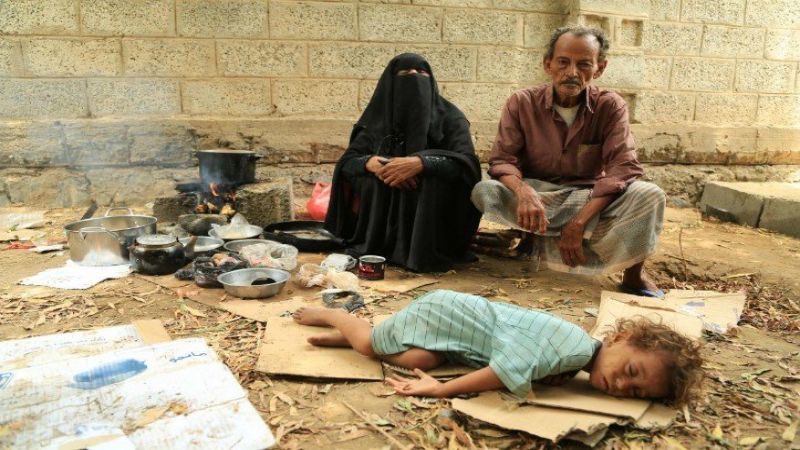
Local Editor
“Yemen is the world’s worst humanitarian crisis. It’s not just in the media. It’s reality.”
These words from Indra Adhikari in Yemen struck me to the core.
Through one of modern technology’s miracles, Indra, his two colleagues and I spoke from my home and his office.
Suddenly, via a crackling computer audio link, this crisis was no longer half a world away. It was in my living room.
Right now, after more than three years of conflict, people in Yemen could be at risk of facing the worst famine the world has seen in 100 years.
And an average of 75 people are killed or injured every day.
Nearly every child, woman and man in Yemen is affected.
A whole country is going hungry
Indra knows first-hand what this is like. He works in disaster management at the International Federation of Red Cross and Red Crescent Societies (IFRC) in Yemen.
Together, the Red Cross and the Yemen Red Crescent, a British Red Cross partner, co-ordinate and deliver emergency aid. Donations to the British Red Cross help fund this.
“More than 80 per cent of the country has felt the terrible impact of the conflict and other emergencies and they need help.
“The biggest need in the country is food, of course,” Indra said.
More than 18 million people in Yemen are going hungry, with over 14 million at risk of starvation, according to the UN. Imagine roughly twice the population of London going without food.
Add to the mix that fighting has forced two million people to leave their homes with just what they could carry.
That’s like twice the number of people who live in Birmingham fleeing for their lives.
What life is like in Yemen now
“We are living through this,” Indra said.
“Before the conflict, around a third of Yemen’s people worked for the government. But their salaries or pensions have not been paid for a staggering two years.”
This covers everyone from doctors to teachers, and from street sweepers to civil servants.
“At the same time, the cost of food has gone up by 50 to 100 per cent,” Indra added. “And half of health facilities are closed because of the conflict. This is why people really need support from the outside.”
Yemen was dealing with severe drought even before the conflict.
Now fighting has damaged or destroyed water systems around the country.
An unimaginable 16 million people – more than five times the population of Wales – are living without clean drinking water.
This has led to cholera raging in Yemen in the largest outbreak ever recorded.
Working together through our shared principles
From all over the world, the Red Cross and Red Crescent Movement is rallying to help.
“During any emergency we distribute food and water, and our ambulance services take people to hospitals and our health centres,” said Nessren Ahmed, from the Red Crescent.
The Red Cross and Red Crescent gave food parcels to over half a million people and provided hundreds of thousands with clean water.
We’re also helping 24 health centres stay open and treat patients.
“The Yemen Red Crescent has around 8,000 volunteers across Yemen. Their motivation is to alleviate the people’s suffering,” Nessren said.
“The principles behind the Red Cross and Red Crescent Movement are part of this. The Red Crescent holds regular sessions on the Movement and our values.”
“We have plans in place before we take action in an emergency and then learn from our experience to improve on them,” Nessren said.
“Speaking out for people and their suffering”
“I am new to the [Red Cross and Red Crescent] Movement in Yemen,” Nader Shamlan, who works with Indra at the IFRC, told me.
“What really attracted me to join this particular mission is the dedication of the Yemen Red Crescent. The good co-ordination among the various Red Cross and Red Crescent partners in the country allows us to deliver efficient and effective services.
Together, we can reach the most affected communities.
“It’s interesting and very challenging to be part of such a huge global organisation. The Red Cross or Red Crescent is in most of the world’s countries as part of one big family.”
Nessren added that, “before working for the Red Crescent I was a volunteer.”
“In Yemen, in my hometown every day, working with the Red Crescent gives me a chance to speak out for people and their suffering.”
“For the Red Cross and Red Crescent, there is no compromise,” Nader said. “We draw support from anywhere to help communities in need. And people accept our help more because of our neutrality, independence and humanity.”
Back in the UK, I feel moved by all that Nader, Nessren and Indra have to live with every day. Even more, I feel impressed by what they achieve against such difficult odds.
In the UK, we recently remembered the suffering of the First World War and all that the Red Cross and so many others did to help.
Let’s not look back at Yemen in 100 years, or even next week, and think that we could have done more.
Source: News Agencies, Edited by Website Team